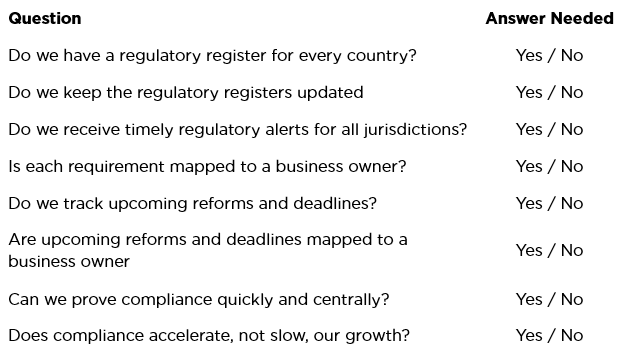There is something I have seen happen again and again in companies and organisations across Africa. Someone asks a seemingly simple question:
“Do we have clarity on what laws apply to us across all the African countries where we operate and whether we are compliant?”
Silence. Papers shuffle. Eyes turn to each other.
And then comes the most common, and dangerous, answer:
“We think so.”
In a continent where regulations evolve fast, enforcement is strengthening, and trust defines market access, “we think so” is no longer a strategy. It’s a risk.
To operate confidently across Africa, companies need something they have historically lacked: a single source of truth for regulatory obligations across jurisdictions, a true African regulatory baseline.
Not abstract theory. Not spreadsheets scattered across departments.
But a structured, dynamic, constantly updated regulatory register built for scale, clarity, and proactive decision-making.
Why This Matters Now More than Ever
Africa is not one market. It is a mosaic of systems: common law, civil law, hybrid models, OHADA jurisdictions, francophone, anglophone, lusophone, and increasingly bilingual and trilingual regulatory environments.
For companies expanding across borders, whether in banking, energy, telecoms, FMCG, infrastructure, or logistics, understanding the laws in the African countries in which they operate is more than compliance; it’s operational survival and strategic advantage.
The complexity is real:
- Legislation published in different formats, languages, and portals
- Regulatory practice that can diverge from statute
- Rapid policy shifts linked to sector reforms, elections, infrastructure programmes, and localisation agendas
- Regulatory authorities emerging and asserting themselves
- Workplace safety and environmental compliance tightening
- Immigration and labour rules evolving as governments balance skills needs with localisation pressure
Each moving piece is manageable alone.
Together, across borders? A potential minefield, unless you build a multi-jurisdiction compliance framework for your African operations from the start.
What a Regulatory Baseline Really Means... In Africa
In the global compliance world, the foundation is clear: a regulatory baseline is your master map.
It tells you:
- What laws and requirements apply
- Which departments own them
- How they map to controls and operations
- Which updates or reforms are approaching
- Where risk is emerging
- Where the organisation may be vulnerable
In Africa, this baseline has a deeper dimension:
- Translation and interpretation across languages
- Visibility across fragmented sources
- Bridging law as written and law as applied
- Proactive regulatory alerts, so change doesn’t hit you unprepared
- Structured, reliable legal information, not second-hand summaries or outdated sources.
It is the difference between “we hope we’re compliant” and “we know we are.”
Why This Is Personal
Afriwise exists because I saw the consequences firsthand, practicing as lawyer in Africa for almost twenty years, supporting executives on their activities in 45+ African countries. They shared the same frustration. They didn’t lack good lawyers. They lacked clarity, structure, and real-time insight.
That belief, that Africa deserves regulatory intelligence equal to or even better than anywhere in the world, drives every piece of Afriwise’s journey.
I’ve sat with GCs who told me they really worry about risks they can’t see. “We don’t know what we don’t know”. I’ve watched boards hesitate on expansion not because they doubted the opportunity, but because they doubted their visibility on what was really required.
No continent with Africa’s potential should be slowed by information fragmentation.
We can do better and we are.
The Cost of Not Having a Single Source of Truth
Without a baseline? Compliance becomes reactive. Risk becomes invisible. Opportunities slip. Reputations get dented.
I’ve seen companies lose licences because one country changed required documentation rules without notice. Firms fined simply because they missed a circular, which wasn’t even sent to them or published on the regulator’s website. Multinationals frozen in procurement cycles because due-diligence documentation wasn’t aligned to evolving requirements. Financial institutions blindsided by cross-border data restrictions (this, by the way, will happen much more often). Industrial projects delayed by environmental clearance misalignment.
Every one of those pain points could have been prevented with a structured regulatory baseline and live alerting.
What Boards and GCs Should Do
If you operate in one African country today and plan to expand, start building the baseline now. If you operate in five or ten, prioritise unification.
Practical Steps:
- Map All Jurisdictions: Especially national, sectoral and regulatory compliance layers.
- Build Your Regulatory Register in Africa: A living system tied to ownership, controls, and evidence trails.
- Implement Real-time Regulatory Alerts: The faster you know, the faster you respond.
- Align Legal, Compliance, and Operations: Compliance cannot live in isolation, integrative governance wins.
- Institutionalise Knowledge: So capability survives turnover, elections, restructures, crises.
Let’s Be Honest: Africa Needs Its Own Model
Africa doesn’t need a copy-paste of another market’s compliance framework.
We need systems built for:
- Multi-language reality
- Multi-regulator ecosystems
- Fast-moving reforms
- Government portals at different maturities
- Local counsel networks that remain essential
Compliance in Africa is not harder, it’s different.
And those who treat it as strategic, not administrative, will lead.
A Vision Forward
A regulatory baseline is not documentation.
It is:
- Confidence for boards
- Empowerment for GCs
- Speed for executives
- Credibility with investors
- Trust with regulators
- Fairness and formalisation in the economy
Africa’s future belongs to organisations that operate with clarity, integrity, and readiness.
Building a regulatory single source of truth is not overhead. It is infrastructure, the quiet infrastructure that enables ambition.
Boardroom Checklist: Your African Regulatory Baseline

If any row above is no, the work starts now.
Closing Thought
Africa is accelerating, and so are its laws and regulations.
The companies that thrive will be those that bring structure where others rely on guesswork.
Not because compliance is a box to tick, but because clarity is power.
The future belongs to those who prepare for it.
--
This article was written by Steven De Backer, Founder & CEO of Afriwise.



